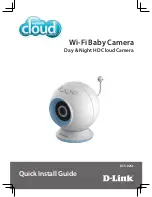
Solving Problems
159
If you’re using a PC notebook:
■
Hold down the
Fn
key on the keyboard and press the function
key that lets you display on an external monitor. It may have an
icon such as
, or it may be labelled
CRT/LCD
. Allow a few
seconds for the projector to sync up after pressing it. Check your
notebook’s manual or online help for details.
On most systems, the
key lets you toggle between the LCD
screen and the projector, or display on both at the same time.
■
Depending on your computer’s video card, you might need to use
the Display utility in the Control Panel to make sure that both the
LCD screen and external monitor port are enabled. See your
computer’s documentation or online help for details.
If you’re using Mac OS X:
1. Open
System Preferences
.
2. Click
Displays
.
3. Click
Detect Displays
.
4. Make sure the
VGA Display
or
Color LCD
dialog box is selected.
5. Click the
Arrangement
or
Arrange
tab.
6. Make sure the
Mirror Displays
checkbox is selected.
The message
Not Supported
is displayed.
■
Make sure the correct input signal is selected in the Signal menu
(see page 118).
■
Make sure your computer’s resolution doesn’t exceed UXGA
(1600
×
1200) and the frequency or refresh rate is supported by
the projector (see page 179). If necessary, change your computer’s
resolution setting as described below.
Only part of the computer image is displayed.
■
Press the
Auto
button on the remote control.
■
Make sure the image
Position
setting is correct in the Signal
menu. See page 119 for more information.
Summary of Contents for 1705C - PowerLite XGA LCD Projector
Page 1: ...PowerLite 1705c 1715c Multimedia Projector User sGuide ...
Page 8: ...8 ...
Page 130: ...130 Fine Tuning the Projector ...
Page 170: ...170 Solving Problems ...
Page 174: ...174 Software Installation ...
Page 182: ...182 Technical Specifications ...
Page 190: ...190 Notices ...
Page 198: ...198 Index ...
Page 199: ...Index 199 ...
Page 200: ...200 Index ...
















































